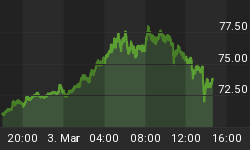Dow Jones Industrial Average 10,712
Value Line Arithmetic Index 2,002
30-Year Treasury Yield (TYX) 4.60%
20+ Year Treasury Bond Price (TLT) 91.90
Gold 1/10 Ounce (GLD) $55.73
The Big Picture for Stocks
The 4-year cycle is negative into late 2006.
Technical Trendicator (1-4 month trend):
Stock Prices Down
Bond Prices Down
Gold Price Up
Last weekend I had the opportunity to chat with a new acquaintance - a tenured economics professor at a major university. The subject came around to the stock market. The gentleman proudly explained that he knows that the random walk theory prevents one from consistently beating the market. So his money is in an index fund.
You know the story line. Here's how he put it to me. First, academic research shows that a series of prices in a market have no predictive impact on future prices. While there are some people like George Soros who have in fact beaten the market, that is irrelevant because if everyone did what Soros does then the advantage of his strategy would disappear.
It is amazing to me that academics cannot see through this weak reasoning. It should be clear that only a limited number of people will actually study what George Soros does, and fewer still will put what they discover about his tactics into practice.
I argued that studies of the markets are the only area that academia does not pursue excellence. Instead, they teach that it is a waste of time to pursue excellence because one's results will sooner or later return to the mean. Yet in all other fields, the universities diligently analyze what successful people do to achieve their results. In art, they study the masters. In athletics, they study scientific training techniques. In business management, they study the great companies to see what they do differently from the unsuccessful companies. Why would they ignore this approach when it comes to markets and investing?
I explained to this gentleman that I myself have successfully beaten the markets over time. Over two complete market cycles, that included the bear markets of 1998 and 2002, I have achieved an annualized rate of return of 28% per year versus 3% on the S&P and the NASDAQ, and 19% on the Wilshire 5000. The prof's amazing answer to me was, "Well, you must have had inside information." His answer was, of course, incredible because certainly I have not had inside information - not only can I not obtain it, it is illegal, and even if one did get such from time to time it would be too sporadic to maintain a long term superior performance.
Academia should pay more attention to what valid research produces. As I point out in my book (Money Matters), there is good data to support the idea that success in the market can be obtained by investing in under-researched companies, out-of-favor companies, smaller companies, and so forth - while paying attention to market cycles. Though many people deny that market cycles are important, part of my personal track record is that I have been able to identify high risk periods for stocks and make portfolio decisions to adjust for that risk. A larger part of this success has been to focus on smaller companies that do not have a Wall Street following.
I argued with my friend that the question of predicting future prices by a series of past prices is the wrong question. The right question is, "What strategies have in fact produced superior returns?"
When my friend emphasized that surely I must have had inside information which would explain the performance, I said that the biggest reason for the track record is a lot of hard work. He looked at me as if to say, "Now there's a novel concept. I never thought of that."
What I might have said to him would have been, "The reason some people are able to beat the market consistently is because our competition has come to rely on the stupid idea from academia that no one can beat the market. So much of our competition is lazy and has a follow-the-herd mentality."
New Offer
We are still a small service and are glad to chat with our subscribers.You are welcome to call us. The number is 512-345-3345.
















